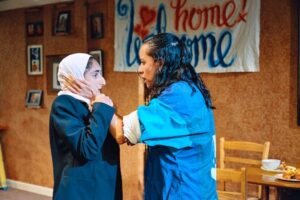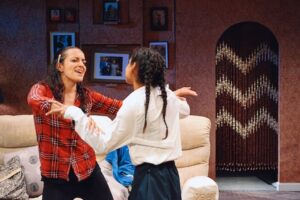Ambreen Razia: Mums and daughters
by Mark Reynolds
“Its tender dissection of motherhood intersects with class, immigrant life, addiction and faith, alongside the emotional effects of incarceration.” Arifa Akbar, Guardian
Ambreen Razia’s remarkable new play Favour at the Bush Theatre, co-directed by Róisín McBrinn of Clean Break and Sophie Dillon Moniram, plots the troubled return to family life of single mum Aleena (Avita Jay) after a spell in prison. While she was away, her teenage daughter Leila (Ashna Rabheru) was in the care of her traditional but loving grandmother Noor (Renu Brindle), whose strict regime of homework and prayer is disrupted by Aleena’s reckless need for fun and excitement. The cast is completed by Rina Fatania’s Fozia, a friend of the family and archetypal ‘auntie’ who is a fussy and judgemental representative of the wider Islamic community. Over the course of just an hour and a half, the play depicts a dizzying array of themes including the pressures of imprisonment, single parenthood, the housing crisis, alcoholism, family secrets, lies and broken promises, shame and punishment, mental illness, and harmful behaviours from favouritism and coercion to physical violence and thoughts of suicide.
Mark: You recently said, “I like anything that’s written from a place of depth and necessity, even if it’s a bit messy and mad,” and you’ve certainly managed to cram all these themes into a coherent and convincing whole. How did it all come together?
Ambreen: It was definitely a labour of love, so much of the play is based on my own upbringing and the dreams of what could have and should have been. It came from wanting to give women a voice who are non-existent on our stages and screens, needing to show instead of tell people the hard-hitting effects of incarceration and addiction on families, particularly mothers and daughters.
The characters in the play each have their own belief system, the conflict comes when they attempt to exercise it on one another, not for any other reason except that they are each other’s lifeline.”
Religion, Islam in particular, and the fear of ‘what the community thinks’ weigh heavily on the family’s choices. What is it about Islamic culture in Britain that you’d like to be better understood?
It’s complex. For many people who have been affected by the criminal justice system, religion is something that many of them turn to, a mantra, routine, God, something bigger that’s outside of themselves. That goes for those who are invertedly impacted by the criminal justice system as well, finding a new normal. The characters in the play each have their own belief system, the conflict comes when they attempt to exercise it on one another, not for any other reason except that they are each other’s lifeline, love each other deeply, and want to set each other free.
You balance dramatic tension within the household with moments of slapstick humour in the shape of interfering do-gooder Fozia. Tell us about the inspiration behind this particular ‘auntie’.
It was important for the outside world to infiltrate the family home. Fozia is a reminder of the standards that Aleena is being held up to even after serving time in prison, but also an auntie who loves and cares for the family. She believes that obedience and compliance is the way forward. Is she wrong? Arguably a representative for the muzzling of women, but also a multifaceted complex woman who had hopes and dreams of her own just like so many women of that generation. If you don’t put characters like Aleena and Fozia on stage together then you’re truly starving your audience.
Favour was commissioned by Clean Break and developed over the course of three years. Can you say something about that process, and about Clean Break’s history, aims and philosophy, and why they and the Bush Theatre are such a good fit?
I was working with Clean Break as an actor initially, it was always my dream to work with them as a company, then they commissioned me as a playwright. Their ethos totally resonates with my belief system about everything! Róisín and I went to New Hall prison and ran workshops with the women. Some of the Muslim women were also kind enough to allow me to interview them, which was unbelievable in terms of development. It’s been magical working with Clean Break and being in the building, they do life-changing work every single day. The Bush Theatre has been pivotal in placing unheard stories centre stage, giving new playwrights the opportunity to put their play on and support them whilst doing so, it’s an incredibly supportive and beautiful space.
Your monologue play The Diary of a Hounslow Girl was adapted with an expanded cast for a BBC Three comedy pilot. Is it your ambition for Favour to follow a similar trajectory, and become a full-blown TV drama?
I’d love that, although I think Favour’s definitely a feature film. Maybe I’ll get in touch with the BFI…
There’s a fantasy sequence between Aleena and Leila that is both joyful and heartbreaking as they are absorbed in frivolous wishes and a longing for happiness that are soon undercut by their reality. Why is it important for them to hold on to seemingly impossible dreams?
In my experience that’s often the reality of of living with an addict, it’s filled with incredible exhilaration one minute and gut-wrenching heartache the next. The possibilities are endless, but that’s all they’ll ever be until that person gets better.
You’ve been involved in several writers’ rooms and writers’ groups. Are you in your element when collaborating with other writers in this way, or do you usually prefer the prolonged gestation of working through plot and character on your own?
There’s nothing more exciting than being in a room with a bunch of talented writers coming up with ideas for a television show. Playwriting however is a much more isolated experience for me, but eventually I need a pair of clever eyes on it.
When Avita steps into Aleena’s shoes every night, I feel deeply connected to all the women I’ve met within the criminal justice system, particularly those who have been separated from their children and long to return to motherhood.”
What did the cast, co-directors and staging creatives each bring to the table once rehearsals were underway, and what kinds of subtle changes did the story undergo on the run-up to opening night?
There were script amendments up until the technical rehearsal. When you see the play in all its glory you realise what’s needed and what’s not, and when you have a brilliant team like ours, they’ll always encourage the best version of the play even if that means everyone working a little bit harder. The first time I saw the tech around the nail salon scene my heart nearly burst.
I enjoyed all the performances, but Avita Jay particularly impressed with her convincing range of anger, vulnerability and unpredictability, as well as her singing and movement. How does her vision for Aleena differ from what you had imagined her to be?
I have tears in my eyes just answering this question, I don’t think I’ve ever been in love with any of my characters the way I love Aleena. I’ve shed tears writing Aleena, she’s the black sheep, the hellraiser but in fact the most noble character in the play. I feel deeply connected to her, and when Avita steps into her shoes every night, I feel deeply connected to all the women I’ve met within the criminal justice system, particularly those who have been separated from their children and long to return to motherhood. Avita Jay was a godsend, she’s a remarkable woman, a leading lady on and off the stage which was very important when casting Aleena. She’s a roaring talent with such integrity and a beautiful performer, she transformed this character into something truly honest and inspirational. She’s a gift and I have such unbelievable respect for her.
Who do you count among your all-time heroes as performers and writers?
I’ve always loved Roy Williams’ work, his characters are all too familiar to me being a Londoner. Lorca, Shakespeare, Caryl Churchill, Sarah Kane, Mamet, I love Ken Loach, Shane Meadows, Peter Mullan, Kathryn Hunter, David Thewlis, the cast of Favour!
And your favourite fictional characters?
Vito Corleone, Tony Soprano, Walter White, Lucy Ricardo, Sister Aloysius, Bernarda Alba, Villanelle, Woody (This is England ’88), Thelma and Louise, Linda La Hughes, Ma Rainey, every character from Do the Right Thing. The list goes on…
Are there any books, new or classic, you’d like to adapt – or see adapted – for stage or screen?
A Thousand Splendid Suns by Khaled Hosseini turned into a television series, that would be stunning!
What are you writing next? And what’s new on the acting front?
I’ve just finished filming a job for Apple TV, and I’m currently writing a new play about four women all of whom are ex-gang members in their 50s who reunite for one last score, and a bunch of poems that are so terrible it’ll only be me who reads them.
Ambreen Razia is an actress and writer from South London. Her critically acclaimed play The Diary of a Hounslow Girl toured the UK and was adapted as a BBC Three pilot in 2018. Her play POT, which focuses on girls in gangs and children in the UK care system, completed a national tour in the same year. She co-wrote her short film Relapse, which centred around reoffending after prison. Her screenplay Romani Girl was commissioned and produced by Theatre Royal Stratford East in 2020. Ambreen has been part of the BBC Writers’ Room and on the BBC Talent Hotlist, as well as being a member of the Royal Court Writers Group, and co-edited the BBC Radio 4 chat show Gossip and Goddesses with Meera Syal. Her recent acting credits include Hounslow Diaries (BBC), Scrapper (BFI/Film 4), Black Mirror (Netflix), This Way Up (Channel 4), Starstruck (BBC) and The Curse (Channel 4). Awards include Best Newcomer (Asian Media Awards), Eastern Eye’s ‘Emerging Artist’ award and ‘Best Newcomer’ at the Edinburgh Television Awards.
Favour at the Bush Theatre, London. 24 June to 6 August 2022.
More info
@AmbreenRazia
@bushtheatre
@CleanBrk
The playscript is published by Nick Hern Books
Read more
Mark Reynolds is a freelance editor and writer, and a founding editor of Bookanista.
@bookanista
wearebookanista
bookanista.com/author/mark




